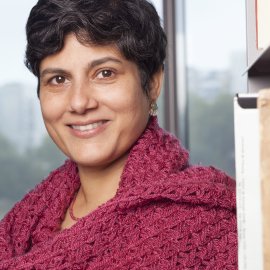Independent scholar

Octobre 2019 à juin 2020
Rochelle Pinto was Research Fellow at the Nehru Memorial Museum and Library, in New Delhi, from 2015 to 2017, examining Land and Narrative – the culture of economy in coloniale Goa. She held a research fellowship at the Centre for the Study of Developing Societies, CSDS, in Delhi in 2014 and prior to that, taught literature at Delhi University from 2010 to 2014. She is the author of Between Empires - print and politics in Goa (2007, Oxford University Press), a book theorizing the nature of linguistic politics, print production and colonial rule through the experience of Portuguese colonialism in nineteenth century Goa. She co-directed the project Archive and Access (www.publicarchives.org, www.publicarchives.wordpress.com) when she taught in Bangalore at the Centre for the Study of Culture and Society between 2005 and 2009. She takes part in the project Pensando Goa which focuses on literature in Portuguese emerging from Goa, and is on the Scientific Committee of the project, ‘Politics and Culture in Colonial Periodical Press’. She was born in India, in Bombay, graduated from St. Xavier’s College with English literature, completed her Master’s programme at the Centre for Linguistics and English at Jawaharlal Nehru University and her PhD at the Department of Languages and Cultures of South Asia at SOAS, London in 2003.
"land and narrative – the culture of economy in colonial Goa"
Rochelle Pinto’s research on nineteenth century discourses of land examines traces of Thomist and other strains of European philosophy that influenced Portuguese political thought, and the crafting of polities in the colonies. It discusses how these ideas shaped arguments regarding the relationship to land and to the agrarian economy, in combination with French physiocratic and British ethnographic discussions of land. Novels and treatises incorporated these alongside indigenous civilizational narratives related to settled agriculture. Discourses of land therefore both incorporated and resisted these elements that spoke of agrarian life, caste, and the settling of the village in India.
The currents of philosophical and economic thought from prior centuries in Portugal remain as understudied elements though they persist in nineteenth century writing. Though the nineteenth saw the ascendance of theories of political economy and other conceptions emanating from the English and French enlightenment, strands of less dominant philosophies persisted and continued to shape political ideas into the twentieth century. Recent research has begun to trace the influence of Jesuit philosophies in the field of economy, but their percolation into the everyday running of the Portuguese empire, particularly in later centuries in Goa, has not yet been attempted.
PINTO, Rochelle, ROSSA, Walter & MENDIRATTA, Sidh Losa. "Portuguese colonialism in Goa - nineteenth-century perspectives", in Revista Crítica de Ciências Sociais, University of Coimbra, Portugal, 2018.
https://journals.openedition.org/rccs/6864
PINTO, Rochelle. "The Foral in the history of the comunidades of Goa", in Journal of World History, University of Hawaii Press, 2018.
PINTO, Rochelle. "In keeping with character – early encounters with ethnography in Os Brahamanes", in Via Atlântica, Universidade de São Paulo, Brazil, 2017.
PINTO, Rochelle. "Settling the land – the village and the threat of capital in the novel in Goa", in Commodities and Affect (CHAUDHURI, Supriya, McDONAGH, Josephine, H. MURRAY, Brian & RAJAN Rajeswari Sunder), Routledge, 2017, pp. 100-112.
PINTO, Rochelle. "At Home in Bombay: housing Konkani print", in Founts of Knowledge, Volume III, Book History in India (ABHIJIT, Gupta & CHAKRAVORTY, Swapan), OrientBlackswan, 2015, pp. 74-105.